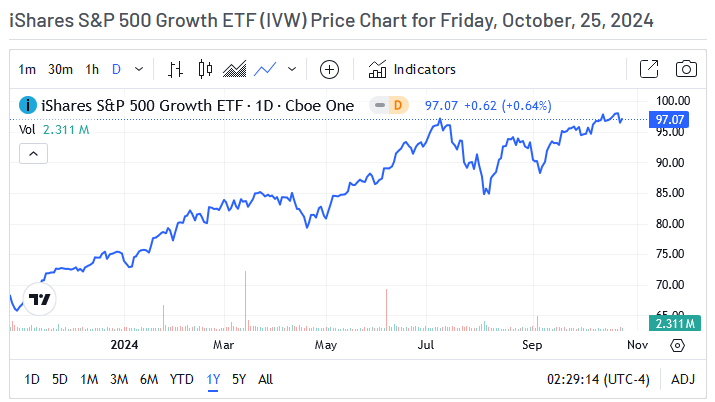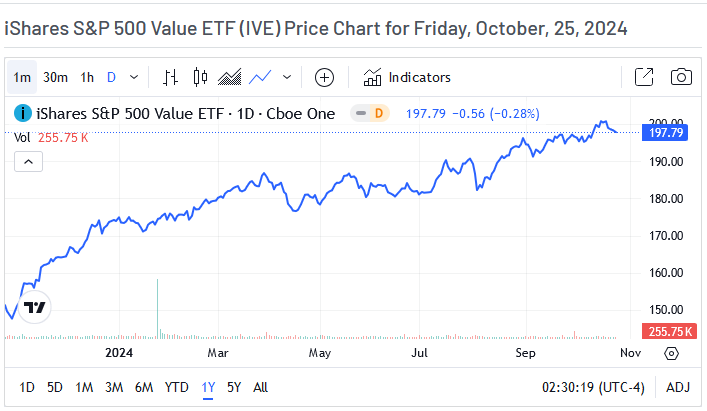- There are signs of a potential rotation in the stock market, which would favor value stocks and hurt growth stocks.
- Two ETFs have come to show ways to play this rotation, and their price actions also offer a signal that this change is imminent.
- Individual stocks and their perceptions from Wall Street analysts show the amplified effects of these trends for investors to consider.
The stock market typically reflects the consensus belief toward an economy, and today, the S&P 500 calls for continued economic growth in the coming quarters. However, a major warning sign suggests that most—if not all—of this potential future growth has already been priced into the index today. That warning sign is falling volume.
Just like any other product or service, as the price gets too high, fewer transactions take place. This is why investors might want to look away from growth stocks (as their growth is likely priced in as well) and rather start considering value stocks, characterized by their discount to future growth, keeping portfolios fundamentally aligned to the future economy. To do this, a couple of exchange-traded funds (ETFs) should be considered.
Representing the growth side of the equation, the iShares S&P 500 Growth ETF (NYSE:IVW) holds all of the high earnings per share (EPS) growth names in the market, regardless of their valuations today. Then, for the value factor, investors can look into the iShares S&P 500 Value ETF (NYSE:IVE), which holds quality companies at apparent discounts to offer a better opportunity in today’s market.
Momentum vs. Value: Are Growth Stocks Still Worth Chasing?
On a year-to-date basis, the S&P 500 Growth ETF has outperformed the Value ETF by as much as 20%, which would be enough to get more people who are chasing momentum into the growth trade without considering Value. At the same time, when investors zoom in for a three-month view, the past quarter looks a lot different than the year.
Some of the top holdings in this growth ETF include shares of Apple (NASDAQ:AAPL) and NVIDIA (NASDAQ:NVDA), which are a bit concentrated in the technology sector today, creating some risk. Warren Buffett sold up to half of his stake in Apple stock last quarter, knowing that momentum was slowing and Value was not that much higher.
Stanley Druckenmiller has been selling out of NVIDIA lately in the same fashion. That should send a warning to investors still chasing growth, as while EPS might outperform in coming quarters, most of that is likely already priced into stock prices today.

Value Stocks Gain Momentum, Signaling a Shift Away from Growth
The S&P 500 Value ETF has outperformed growth by a margin of 2% over the quarter, which could mean the tide is shifting in favor of Value in recent terms and potentially out of growth, which was once the winner for the year so far. Breaking down a list of their holdings can help investors understand some of this dynamic further.
For Value, top holdings include stocks like Berkshire Hathaway (NYSE:BRKb) and even a pick from the energy sector in shares of Exxon Mobil (NYSE:XOM).
These names make more sense in an economy that could experience a rotation, as Value becomes a more important factor in portfolios and where oil becomes expensive as markets think ahead.
Why the Market Rotation Is Shifting Toward Value and Energy Stocks
Even Warren Buffett has decided to plunge into energy, as he bought up to 29% of Occidental Petroleum (NYSE:OXY) in recent quarters. Investors need to notice that the trend is moving out of the technology sector and into energy and other value stocks.
This happens every cycle, as technology and energy are negatively correlated (when one goes up, the other goes down, and vice versa). So, the rotation being made by mega investors can be taken as a sign of the times. More than that, the performance difference between the growth and value ETFs also acts as a potential signal.
Investors can observe that whenever the spread between growth and value becomes too wide, oil price shocks often follow in a near mirror image. With growth currently outpacing value, it aligns with Buffett’s rotation strategy, suggesting it might be worth considering a similar shift.
To crystallize this trend, investors can consider the diverging opinions coming from Wall Street analysts, particularly price targets for Apple and Exxon Mobil stock. Starting with Apple, it looks like those at Barclays and Jefferies Financial Group see some downside ahead for the technology darling.
With respective price targets of $186 and $212.9 a share, these ratings call for up to 21.3% and 11% downside from where Apple stock trades today, amplifying the recent trends seen in rotations out of the space as part of increased risk profiles. The views for Exxon Mobil stock show the same movement.
Analysts at Scotiabank recently decided to boost their ratings for Exxon Mobil stock to “Sector Outperform” alongside a valuation of up to $145 a share, up from their previous target of $129. This new view would call for up to 20.3% upside from where Exxon Mobil stock trades today.
When these trends and rotation gain more momentum, investors would be remiss not to have positioned themselves in these areas before the fact, which is why today’s list is as important as ever during the new upcoming cycle.
